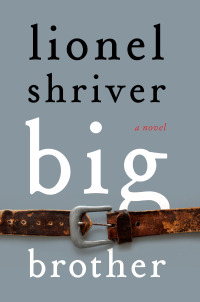
Published by Harper on June 4, 2013
"More concept than substance, food is the idea of satisfaction, far more powerful than satisfaction itself, which is why diet can exert the sway of religion or political zealotry." But as Pandora Halfdanarson learns, weight loss is a shabby religion: "you could only continue to worship at the altar of comestible restraint if you chronically failed your vows." Pandora has gained more than twenty pounds in the last three years, but she doesn't stand out in a generation of people who are battling (or surrendering to) obesity, who are marked as members of an underclass because of their weight. Many participate in "the national sport" of dieting, but few succeed. Pandora's obsession with her weight and that of her brother -- and, by extension, our national obsession with our own appearance and that of others -- is at the heart of Big Brother.
Quietly subversive, studiously non-opinionated, confidently dull, and intensely self-critical, Pandora is the epitome of a Lionel Shriver protagonist. The daughter of a former television star who has faded from the national memory, Pandora is a married loner, comfortably living within her own mind. Not wanting to be "a hyperlink to someone else's Wikipedia page," she shuns the derivative fame that her father's stage name brings. She would prefer anonymity to the celebrity she attained when her successful business, Baby Monotonous, landed her on magazine covers.
Pandora's brother, Edison, does not share her insular nature. He can talk all day, "at the end of which no one knew him any better than before," and he has adopted their father's stage name as his own. Edison's career as a jazz pianist isn't going well. Needing a place to live, he travels to Iowa to stay with Pandora. Seeing Edison for the first time in several years, Pandora is shocked to discover that he is huge, a very big brother indeed. At first, Pandora doesn't know how to broach the subject tactfully and so ignores it, but: "The decorousness, the conversational looking the other way, made me feel a fraud and a liar, and the diplomacy felt complicit."
To the extent that Big Brother is (as Shriver's novels so often are) an exploration of a social problem by illustrating its impact on a single family, Pandora's attempt to understand and explain Edison's obesity can be taken as Shriver's effort to understand why so many people gobble down Cinnabons and Big Macs, knowing they are putting their health at risk. Does Edison overeat because he's depressed or is he depressed because he's fat? Perhaps he binges to showcase his sense of failure on a grand scale. While Pandora's puzzlement about her brother approaches judgment -- something that is contrary to her nature and that leads her to question the stereotypes associated with size -- she also wonders why obesity's status as a social issue should make Edison's diet and lethargy anyone's business but Edison's. Or is eating oneself to death the business of everyone who cares about the eater?
Just as Shriver frequently draws literary themes from social issues, she is a tireless explorer of marital and family issues. Pandora has an inflexible husband, a rebellious teenage stepson, and a needy brother. She wonders how much support a sibling can expect when the sibling's demands are a source of marital stress. Fletcher Feuerbach, Pandora's husband, represents Edison's opposite extreme: he bicycles fifty miles a day and refuses to eat anything made from white flour. Edison's oversized presence drives a wedge between Pandora and Fletcher. Fletcher wants to escape Edison's "miasma of sloth," but Fletcher's rigid diet is just as maddening as Edison's unwillingness to diet. When Pandora accuses Fletcher of being on "a moral crusade" against fat, she exposes his true motivation for complaining about Edison: the complaints stoke his own sense of superiority.
To avoid spoilers, I won't discuss the meat of the story. Suffice it to say that diets have their downsides and that the honest portrayal of family drama is Shriver's greatest skill. The wry humor that often seeds Shriver's work is abundant here, but she remains one of the most serious, insightful, and penetrating chroniclers of the human condition to be found in current American literature. She writes with sensitivity and compassion, from a variety of perspectives, without ever becoming preachy. An ending that recasts the story in a different light initially disappointed me, but after I thought about it, I came to understand and appreciate it. This isn't Shriver's best work, but it's awfully good.
RECOMMENDED